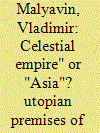| Srl | Item |
| 1 |
ID:
183442


|
|
|
|
|
| Summary/Abstract |
This article deals with the philosophical foundations and historical consequences of two influential political concepts in the Far East: New Celestial Empire and Asia as Method. The author shows that politics in the Far East have been traditionally based on the categories of the Void and Transformation, which gave rise to a specific type of Utopian consciousness with its motif of universal co-being within the encompassing yet singular event. The New Celestial Empire concept reflects global aspirations of the PRC, taking into consideration local specifics. The concept of Asia as Method aims at decolonization and deimperialization in the Commonwealth of Independent States (CIS) and is popular in Japan, South Korea, Taiwan, and Hong Kong. The author examines the confrontation between these theories and suggests ways for their possible integration.
|
|
|
|
|
|
|
|
|
|
|
|
|
|
|
|
| 2 |
ID:
172614


|
|
|
|
|
| Summary/Abstract |
The principles of China's current foreign policy and global strategy are examined, along with their connection to the world-view prerequisites of traditional Chinese philosophy, culture, and politics. The author shows that a category of transformations (e.g., hua and yi) that emphasize conformity, the importance of certain events in the life of a person or country, and the hidden continuity of polar values lie at the heart of the traditional Chinese world-view, strategy included. From this premise stems the concept of the existence of two dissimilar but not individual world orders. Opposition between an individual and the outside world is not allowed. The historical significance of the ideal of a "Community of Common Destiny" and the concept of a "New Celestial Empire" promoted by the Chinese leadership is marked by parallels between Chinese and contemporary Western philosophy.
|
|
|
|
|
|
|
|
|
|
|
|
|
|
|
|